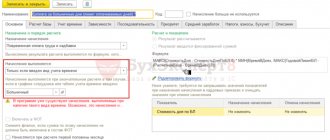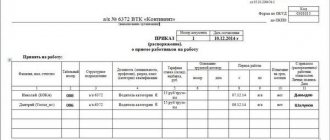Documenting
An organization may provide for the payment of one-time bonuses in its internal documents:
- employment contract (paragraph 5, part 2, article 57 of the Labor Code of the Russian Federation);
- collective agreement (part 2 of article 135 of the Labor Code of the Russian Federation);
- in a separate local document of the organization (Regulations on remuneration, Regulations on bonuses, etc.) (Part 2 of Article 135, Article 8 of the Labor Code of the Russian Federation).
In this case, a one-time bonus may be an integral part of the remuneration system. Accordingly, one-time bonuses for production results can be taken into account when calculating average earnings.
However, one-time bonuses may not be part of the organization’s remuneration system and are assigned only by order (order) of the manager.
The basis for the accrual of any one-time bonus is the manager’s order to reward an employee (Form No. T-11) or a group of employees (Form No. T-11a). The order is signed by the head of the organization. The employee (employees) must be familiarized with the order against signature (Section 1 of the instructions approved by Resolution of the State Statistics Committee of Russia dated January 5, 2004 No. 1).
What the Tax and Labor Codes of the Russian Federation say
The Labor Code provides for the right to monetary incentives for employees (paragraph 4, paragraph 1, article 22 of the Labor Code of the Russian Federation, paragraph 1, article 191 of the Labor Code of the Russian Federation). The consolidation of the bonus regime in local documents is reflected in clause 2 of Art. 191 Labor Code of the Russian Federation, paragraph 2 of Art. 191 Labor Code of the Russian Federation. Finally, the possibility of accounting for these payments as part of remuneration for labor or another form of incentives is given in Art. 135 Labor Code of the Russian Federation.
Tax legislation regulates the payment of bonuses to employees as part of the company's profit expenses. Art. 25 of the Tax Code of the Russian Federation lists the purposes for which these funds can be used, and Art. 225 of the Tax Code of the Russian Federation approves a reduction of the tax base by this amount.
Prerequisites for including bonus expenses in labor costs:
- the bonus should be assigned and paid exclusively for achievements related to the employee’s professional employment;
- the conditions for receiving a bonus and the possibility of depreciation must be clearly regulated in the collective agreement or employment contracts of employees (you can make a reference to the Regulations on Bonuses in these documents), indicating the procedure for accrual and specific amounts.
If the paid bonus does not meet these conditions, then the Tax Code refers it to Art. 270, which speaks of the employer’s right to award staff remuneration for achievements that are not related to the employment contract and are not noted in it. Moreover, funds for their payment are taken not from the wage fund, but from target funds, special purpose funds or net profit at the end of the year (Letter of the Ministry of Finance of the Russian Federation dated October 19, 2007 No. 03-03-06/1/726).
Accounting
The procedure for reflecting one-time bonuses in accounting depends on the sources from which they are paid:
- due to expenses for ordinary activities;
- at the expense of other expenses;
- due to net profit;
- due to the formation of the cost of fixed assets.
As a rule, in accounting, bonuses accrued for labor performance are classified as expenses for ordinary activities (clauses 5 and 7 of PBU 10/99). Record the accrual of such bonuses as follows:
Debit 20 (08, 23, 25, 26, 29, 44) Credit 70
– the bonus is accrued at the expense of expenses for ordinary activities (the bonus is included in the cost of the fixed asset).
Non-production one-time bonuses (for anniversaries, holidays, etc.) are classified as other expenses in accounting (clause 11 of PBU 10/99). Reflect their accrual as follows:
Debit 91-2 Credit 70
– the bonus is accrued at the expense of other expenses.
If the source of payment of bonuses (both production and non-production) is retained (net) profit, make the following entry:
Debit 84 Credit 70
– the bonus is accrued at the expense of net profit.
This procedure follows from the Instructions for the chart of accounts (account 70).
The bonus is for work, but not only
The bonus is an incentive payment included in the remuneration for work. If the company uses a bonus payment system, then the bonus will be an integral part of the money earned by the employee, regardless of how exactly he worked. It all depends on how this situation was regulated in the company’s internal regulations: employment contracts, collective agreement, specially created Regulations on bonuses, etc.
However, there are special types of payments that are not made on an ongoing basis, for example, remuneration paid to employees who participated in a successful project, or cash payments for certain holidays. It is impossible to foresee them in advance, therefore, it is also not possible to prescribe their regulations in local acts.
The taxation of bonuses related to the planned and unplanned groups is significantly different, since they are included in different accounting items.
Personal income tax and insurance premiums
Regardless of the taxation system that the organization uses, personal income tax must be withheld from the entire premium amount (subclauses 6 and 10, clause 1, article 208 of the Tax Code of the Russian Federation).
Situation: in what month should the amounts of one-time bonuses be included in the personal income tax base: in the month of accrual or in the month of payment?
The calculation of personal income tax depends on whether the bonus is industrial or not.
Non-production one-time bonuses (for example, for an anniversary, a holiday) are not part of the salary and, therefore, do not relate to labor costs. Therefore, include their amount in the personal income tax tax base of the month in which they were paid (subclause 1, clause 1, article 223 of the Tax Code of the Russian Federation).
The calculation of personal income tax on one-time production bonuses, in turn, depends on the period for which they are accrued:
- month;
- quarter;
- year;
- upon the occurrence of a specific event (for example, a one-time bonus for the successful completion of a project). One-time production bonuses paid upon the occurrence of a specific event should be included in the personal income tax tax base at the time of payment to the employee (subclause 1, clause 1, article 223 of the Tax Code of the Russian Federation).
For the amount of a one-time bonus for labor performance, add:
- contributions for compulsory pension (social, medical) insurance (Part 1, Article 7 of Law No. 212-FZ of July 24, 2009);
- contributions for insurance against accidents and occupational diseases (clause 1 of article 20.1 of the Law of July 24, 1998 No. 125-FZ).
This rule applies regardless of whether the bonus is provided for in the employment contract or not (letter of the Ministry of Health and Social Development of Russia dated August 12, 2010 No. 2622-19).
Situation: is it necessary to charge insurance premiums for the amount of one-time bonuses that were given to employees for an anniversary or holiday? That is, these payments are not related to labor performance.
Answer: yes, it is necessary.
According to the general rules, insurance premiums are subject to all payments that the employer accrues within the framework of labor relations (Part 1, Article 7 of the Law of July 24, 2009 No. 212-FZ, Clause 1 of Article 20.1 of the Law of July 24, 1998 No. 125-FZ). And since bonuses are awarded to employees (i.e., people with whom the organization has entered into employment contracts), then we can consider that these are payments within the framework of labor relations (Article 16 of the Labor Code of the Russian Federation).
In addition, one-time bonuses are not named in the closed lists of payments that are exempt from:
- contributions for compulsory pension (social, medical) insurance (Article 9 of the Law of July 24, 2009 No. 212-FZ);
- contributions for insurance against accidents and occupational diseases (Article 20.2 of the Law of July 24, 1998 No. 125-FZ).
Thus, insurance premiums must be calculated on the amounts of one-time premiums. It does not matter for what reason the bonus is paid - for achieving certain labor results or in connection with some event (anniversary, holiday, etc.).
This approach is also confirmed by arbitration practice (see, for example, Resolution of the Presidium of the Supreme Arbitration Court of the Russian Federation dated June 25, 2013 No. 215/13, Resolution of the FAS Volga District dated March 6, 2012 No. A12-10291/2011).
Advice: if you are ready to argue with inspectors, then insurance premiums for one-time bonuses that are not related to work performance may not be charged.
The following argument will help in the dispute.
Bonuses for an anniversary (holiday, etc.) cannot be considered paid within the framework of labor relations. And therefore there is no reason to charge insurance premiums. It is explained this way.
The mere fact that there is an employment relationship between employees and the organization does not indicate that all payments accrued to employees represent payment for their labor. Thus, one-time bonuses paid for an anniversary, holiday, etc. do not depend on the employee’s qualifications, complexity, quantity, quality and conditions of the work he performs. And accordingly, they are not remuneration for labor and an element of remuneration. If so, then they cannot be recognized as paid within the framework of the labor relationship.
There are examples of court decisions confirming this approach (see, for example, decisions of the Federal Antimonopoly Service of the North-Western District dated September 20, 2013 No. A66-15138/2012, Central District dated November 6, 2012 No. A64-1493/2012).
At the same time, given the ambiguity of arbitration practice, it is difficult to predict the outcome of litigation on this issue. Judges can side with both the organization and the inspectors.
The amount of the one-time bonus is included in the tax base for personal income tax (subclause 6, clause 1, article 208 of the Tax Code of the Russian Federation).
Is income tax charged on the premium?
Organizations and individual entrepreneurs performing the functions of tax agents must calculate, withhold and transfer personal income tax to the budget from the income of their employees in accordance with the norms provided for in Art. 226 of the Tax Code of the Russian Federation, taking into account Art. 217 Tax Code of the Russian Federation. Employee income also includes remuneration for the performance of their work duties - that is, wages (subclause 6, clause 1, article 208 of the Tax Code of the Russian Federation).
Wages also include incentive payments that encourage employees for work performed, which in particular are bonuses (Article 129, Article 191 of the Labor Code of the Russian Federation).
The bonus is subject to personal income tax, since this payment to employees is subject to income tax and is not included in the list of income not subject to personal income tax (subclause 6, 10, paragraph 1, article 208, article 217 of the Tax Code of the Russian Federation).
Income tax: general procedure
One-time bonuses are taken into account when calculating income tax if two conditions are simultaneously met:
- bonuses are provided for in the labor and (or) collective agreement, as well as local acts (paragraph 1 of article 255 and paragraph 21 of article 270 of the Tax Code of the Russian Federation);
- bonuses relate to incentive payments and depend on labor indicators (work experience, official salary or production results) (clause 2 of article 255 of the Tax Code of the Russian Federation).
This position is confirmed by the Ministry of Finance of Russia in letters dated March 15, 2013 No. 03-03-10/7999, dated May 28, 2012 No. 03-03-06/1/281 and the Federal Tax Service of Russia in letter dated August 13, 2014 No. GD-4-3/15717.
Situation: when calculating income tax, is it possible to take into account the costs of paying one-time bonuses that are not related to the employee’s performance of his job duties (for example, for an anniversary, holiday, for winning competitions, etc.)?
Answer: no, you can't.
One-time bonuses that are not related to the employee’s performance of his job duties (for an anniversary, a memorable date, for winning professional skills competitions, for conferring honorary titles, etc.) do not reduce the tax base for income tax. This is explained by the fact that such awards:
- are not related to the production activities of the organization (not aimed at generating income), and therefore do not meet the criterion of economic justification of costs (clause 1 of Article 252 of the Tax Code of the Russian Federation, letter of the Ministry of Finance of Russia dated March 15, 2013 No. 03-03-10/7999 , dated February 22, 2011 No. 03-03-06/4/12);
- are not incentive payments related to labor performance and the employee’s performance of a job function, therefore they cannot be taken into account in expenses as part of remuneration (Article 255 of the Tax Code of the Russian Federation, letter of the Ministry of Finance of Russia dated April 24, 2013 No. 03-03-06/1 /14283, dated December 12, 2012 No. 03-03-06/4/114).
If bonuses do not reduce the tax profit of the organization, then permanent differences arise in accounting (clause 4 of PBU 18/02). Permanent differences lead to the formation of a permanent tax liability (clause 7 of PBU 18/02).
Advice: there are arguments that allow organizations to take into account, when calculating income tax, the costs of paying one-time bonuses that are not related to the employee’s performance of his job duties. They are as follows.
Any bonuses that an organization pays to its employees are considered incentive payments (Part 1 of Article 129 of the Labor Code of the Russian Federation). At the same time, the organization has the right to independently establish an incentive system for employees (Article 144 of the Labor Code of the Russian Federation). In turn, incentive accruals provided for by the labor and (or) collective agreement are taken into account when calculating income tax (clauses 1, 2 of Article 255 of the Tax Code of the Russian Federation).
Therefore, if all of the above conditions are met, the organization has the right to take into account non-production bonuses (for example, accrued for holidays) as part of labor costs.
However, in order to comply with the requirement of reasonableness of costs provided for in paragraph 1 of Article 252 of the Tax Code of the Russian Federation, certain conditions for assigning non-production bonuses should be provided.
For example, as a justification for paying a bonus and its focus on generating income, you can indicate that bonuses for holidays are not paid to employees who have disciplinary offenses. Therefore, the payment of such a bonus is aimed at increasing employee interest in the results of production activities. A similar condition for the payment of a bonus when resolving a dispute in court was a sufficient argument for the lawful attribution of such payments to labor costs (see, for example, the resolution of the Federal Antimonopoly Service of the Moscow District dated February 24, 2010 No. KA-A40/702-10).
It is also possible to justify the economic orientation of bonuses paid to non-smoking employees. Quitting smoking reduces lost working time. Therefore, payments to non-smoking employees are stimulating. And if such bonuses are provided for in collective or employment agreements, they can be taken into account as expenses when calculating income tax. The legality of this position was confirmed in the resolution of the Federal Antimonopoly Service of the East Siberian District dated June 24, 2014 No. A33-1611/2013.
In addition, if non-production bonuses are initially provided for in an employment (collective) agreement, then a potential employee takes into account the possibility of receiving them when assessing the feasibility of working in a particular organization. Therefore, such incentive payments can help attract the necessary specialists to the organization. This means that these costs are economically justified. This was indicated by the FAS Moscow District in its resolution dated June 17, 2009 No. KA-A40/4234-09. By ruling of the Supreme Arbitration Court of the Russian Federation dated October 23, 2009 No. VAS-13115/09, the transfer of the specified case for consideration by the Presidium of the Supreme Arbitration Court of the Russian Federation was refused.
However, if an organization uses this point of view and takes into account the amount of non-production bonuses in expenses when calculating income tax, then, most likely, it will have to defend its point of view in court.
Include the amount of bonuses for labor performance in tax accounting as part of labor costs (clause 2 of Article 255 of the Tax Code of the Russian Federation).
Deadline for payment of annual bonus
The very fact of paying the bonus at the end of the year before its end contradicts the essence of this payment. This is due to the fact that the bonus is paid precisely “based on the results of the past year.” This means that in order to pay such a bonus, the organization must summarize the work for the year. Of course, this can be done no earlier than December 31st.
When paying an annual bonus before the end of the calendar year, an organization may face a number of significant problems. For example, if bonuses are calculated in proportion to the time worked in a year. In this case, if an employee gets sick or goes on vacation (cannot perform duties for another reason), the bonus accrued to him will have to be recalculated. The amount of overpaid bonuses will need to be withheld from the employee. But the organization cannot do this on its own initiative (Article 137 of the Labor Code of the Russian Federation).
As a result, we advise you to refrain from paying the annual bonus until the end of the year. That is, you will not have any problems if you pay a bonus based on the results of your work for the year on December 31 of the current year or later.
However, from the point of view of the Labor Code of the Russian Federation, there are no violations in early payment. Therefore, if you want to pay the annual bonus ahead of schedule, pay it. But, at the same time, take into account the risks mentioned above.
The basis for calculating the annual bonus for 2020 is the order of the manager to reward an employee or group of employees (using unified forms No. T-11 and No. T-11a or an independently developed form).
Example 1
Joint Stock Company "Liga"
ORDER No. 65
Moscow12/29/2018
1. In accordance with the bonus regulations of Alpha LLC, I order that a bonus be paid for the conscientious performance of labor duties, exceeding planned labor indicators, and also receiving the maximum grade at the annual certification to the following employees:
- Chief Accountant A.S. Glebova – in the amount of 10,000 rubles;
- accountant V.N. Zaitseva - in the amount of 5,000 rubles.
2. Bonuses must be paid no later than January 15, 2020.
General Director _____________ A.S. Pushkin
Example 2
LLC "Liga"
ORDER
About the calculation of bonuses based on the results of 2020
12/18/2018 No. 12-ls
In order to stimulate employees of Liga LLC and in pursuance of the norms of the Regulation on bonuses dated December 12, 2016 No. 124, I order:
- Based on the results of activities for 2020, I order that all employees receive a bonus in the amount of a monthly salary.
- The chief accountant must make accruals by December 29, 2018.
- The head of the HR department should familiarize all employees with the order against signature.
- Control over the implementation of this order is assigned to the chief accountant.
Signature, transcript
Example 3
Income tax: accrual method
If an organization uses the accrual method, the procedure for recognizing expenses in the form of bonuses depends on whether they are direct or indirect expenses.
If bonuses relate to indirect expenses, then they must be recognized at the time of accrual (clause 2 of Article 318, clause 4 of Article 272 of the Tax Code of the Russian Federation). If one-time bonuses are a direct expense, then take them into account as products, works, and services are sold (paragraph 2, paragraph 2, article 318 of the Tax Code of the Russian Federation). Organizations providing services can take into account direct expenses at the time of their accrual (paragraph 3, paragraph 2, article 318 of the Tax Code of the Russian Federation).
As a rule, bonuses are classified as indirect expenses (Article 318, paragraph 3 of Article 320 of the Tax Code of the Russian Federation). An exception is bonuses paid to employees directly involved in the production of products, performance of work or provision of services (for example, bonuses to production workers). They are classified as direct costs. Such rules are established in paragraph 7 of paragraph 1 of Article 318 of the Tax Code of the Russian Federation.
Situation: can a production organization classify all one-time bonuses as indirect costs?
Answer: no, it cannot.
Organizations independently determine the list of direct expenses (clause 1 of Article 318 of the Tax Code of the Russian Federation, letters of the Ministry of Finance of Russia dated January 26, 2006 No. 03-03-04/1/60, Federal Tax Service of Russia dated February 24, 2011 No. KE-4-3 /2952). However, dividing costs into direct and indirect must be economically justified. Otherwise, tax authorities may recalculate income tax.
Thus, the bonus accrued to employees directly involved in production should be taken into account as part of direct expenses. Refer the bonus for the administration of the organization to indirect expenses.
An example of reflection in accounting and taxation of a one-time bonus accrued for production results. The payment of the bonus is provided for in the employment contract. The bonus was paid out of expenses for ordinary activities. When calculating income tax, an organization uses the accrual method
CJSC Alfa applies a general taxation system (accrual method). The organization pays contributions to compulsory pension (social, medical) insurance in accordance with the general procedure. Contributions for insurance against accidents and occupational diseases are calculated at a rate of 0.2 percent. The organization takes these contributions into account when calculating income tax in the month of accrual.
ZAO Alfa entered into an agreement with manager A.S. Kondratyev fixed-term employment contract for the duration of a specific job (project). The term of the employment contract is from February 1 to March 31. The employment contract provides for the payment of a one-time bonus for the successful completion of the project.
The project was successfully completed on time, March 31st. Kondratiev was awarded a bonus of 50,000 rubles. On the same day, the bonus was paid to the employee.
The bonus will be included in the personal income tax base in March. Kondratiev has no children, so he is not provided with standard tax deductions.
The accountant reflected the accrual and payment of bonuses as follows:
Debit 20 Credit 70 – 50,000 rub. – a one-time bonus was awarded to the employee;
Debit 20 Credit 69 subaccount “Settlements with the Pension Fund for the insurance part of the labor pension” – 11,000 rubles. (RUB 50,000 × 22%) – contributions to finance the insurance part of the labor pension are calculated from the premium amount;
Debit 20 Credit 69 subaccount “Settlements with the Social Insurance Fund for social insurance contributions” – 1450 rubles. (RUB 50,000 × 2.9%) – compulsory social insurance contributions are calculated from the premium amount;
Debit 20 Credit 69 subaccount “Settlements with FFOMS” – 2550 rubles. (RUB 50,000 × 5.1%) – contributions for compulsory health insurance to the Federal Compulsory Medical Insurance Fund are calculated from the premium amount;
Debit 20 Credit 69 subaccount “Settlements with the Social Insurance Fund for contributions to insurance against accidents and occupational diseases” – 100 rubles. (RUB 50,000 × 0.2%) – contributions for insurance against accidents and occupational diseases are calculated from the premium amount;
Debit 70 Credit 68 subaccount “Personal Income Tax Payments” – 6,500 rubles. (RUB 50,000 × 13%) – personal income tax is withheld from the premium amount;
Debit 70 Credit 50 – 43,500 rub. (50,000 rubles – 6,500 rubles) – the bonus was paid to Kondratiev minus personal income tax.
The amount of the premium and insurance premiums from it is included in indirect costs.
In March, Alpha’s accountant took into account the following as expenses:
- the amount of the accrued bonus is 50,000 rubles;
- the amount of contributions for compulsory pension (social, medical) insurance and contributions for insurance against accidents and occupational diseases - 15,100 rubles. (RUB 11,000 + RUB 1,450 + RUB 2,550 + RUB 100).
Are average earnings and vacation pay included in the calculation?
Is holiday bonus included in the calculation of holiday pay? The type of irregular incentives in question may not be taken into account when calculating vacation pay.
But here are the conditions under which it is taken into account :
- The bonuses are still somehow systematized in the company’s documents (according to clause 2 of the Regulations adopted by the Russian Government of December 24, 2007 No. 922).
- The bonuses were issued in the billing period (clause 15 of the same Regulations).
If a one-time bonus is issued for a certain period of time, two things matter:
- Is this gap longer than the calculated one?
- Whether the employee worked out the payroll period in full.
Is vacation pay included in the calculation? The answer to this question can be given by a letter issued by the Ministry of Labor of the Russian Federation dated July 10, 2003 No. 1139-21. The fact is that, according to Article 139 of the Labor Code of the Russian Federation, the calculation of average income includes those indicators that are written down in those papers of the enterprise in which systemic and regular (hence, mandatory) payments are fixed.
Consequently, holiday bonuses are included in such calculations only if they are regular , if they are somehow systematized and carried out at an approved frequency (for example, on every Eighth of March).
Is it charged on weekends and holidays?
The Labor Code of the Russian Federation, namely its Article 153, states that overtime work on weekends and holidays is paid at double salary or tariff, depending on how the earnings of a particular employee are usually formed.
Along with the rate, the bonus may also increase, but only one that is directly tied to the results of a person’s activities and is included in the general labor system (for details on how to bonus employees for work results, read this article). This does not apply to a one-time bonus at all, so additional working days do not affect the size of such a bonus .
Results
Bonuses paid for production results and bonuses not related to the performance of work duties (paid for anniversaries, holidays) are reflected in the 6-NDFL report differently, since the dates of receipt of income differ.
Sources:
- Tax Code of the Russian Federation
- Labor Code of the Russian Federation
- Order of the Federal Tax Service of Russia dated October 14, 2015 No. ММВ-7-11/ [email protected]
You can find more complete information on the topic in ConsultantPlus. Full and free access to the system for 2 days.
Which premium is more profitable for the company?
It happens that the founders decide to pay bonuses to particularly distinguished employees at the expense of profits.
From the point of view of saving on insurance premiums, there is no difference - when paying a premium, regardless of the source, the company will have to charge insurance premiums (clause 1 of Article 420 of the Tax Code of the Russian Federation).
However, by paying bonuses out of profits, the company cannot take such bonuses into account as labor costs. Thus, it is more profitable for companies to include bonuses in expenses.
Let's look at both options with an example.
EXAMPLE 1. HOW TO CALCULATE TAXES ON PREMIUMS
Kolibri LLC paid the head of the sales department, Petrov, a bonus in the amount of 20,000 rubles. Before the bonus was issued, the taxable profit of the company was 150,000 rubles. Situation 1. The bonus is included in labor costs. Insurance premiums are charged on the bonus contributions: 20,000 rub.
× 30% = 6000 rub. The income tax was: (150,000 rubles – 20,000 rubles – 6,000 rubles) × 20% = 24,800 rubles. Thus, the company will pay taxes and contributions in the amount of 30,800 rubles. (6000 + 24,800). Situation 2. The bonus is paid out of profit.
As in the previous situation, insurance premiums also need to be added to the premium: 20,000 rubles. × 30% = 6000 rub. The income tax was: (150,000 rubles – 6,000 rubles) × 20% = 28,800 rubles. The company will pay taxes and contributions in the amount of 34,800 rubles. (6000 + 28,800).
As you can see, in the second case, the company paid taxes and fees of 4,000 rubles. (RUB 34,800 – RUB 30,800) more than in the first one.
The savings are significant; with massive payment of bonuses, they can amount to a decent amount. Thus, it is more profitable for the company to include bonuses in expenses.








